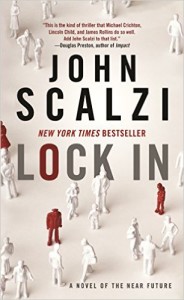
In the not-too-distant future, a flu-like epidemic has swept the globe. Of those who aren’t killed outright, a small but significant proportion develop a neurological complication that renders them conscious but paralysed – the Lock Ins of the title. Referred to as “Hadens” after a former (fictional) FLOTUS, an early contractor of the syndrome, they are implanted with complex nano-technology and able to interact with the outside world through the use of cybernetic prostheses. So yeah. Mind-controlled robots. A minuscule number of individuals are also left with their neurological structures affected in such a way that they can interface with Hadens, acting for short periods as their proxies (known as “integrators”).
We are swept into this universe through a first person protagonist, Chris Shane, who is a rookie FBI agent, the son of a (fictional) former basketball star, and a Haden. On his first day on the job, he and his world-weary (of course), traumatised (naturally), female (more interesting) senior partner are assigned to investigate the violent death of a young man who is not an integrator, but who appears to have the hardware. The suspect is also an integrator – was he acting independently, or was another Haden at the wheel?
The set-up for this novel is not, all things considered, as original as it seems to think it is, but to a large extent, Scalzi makes up for it. The use of the crime novel genre is a good choice: it’s a familiar format, so the reader is forced to take the unfamiliar world on its face when she submits to the police procedural. The prose isn’t revolutionary, but generally it’s not distractingly bad. The characters, unfortunately, tend to be developed in that overly rapid and dramatic way that sci fi characters often are.
Early on, it looks like the novel is going to have some interesting things to say about the social model of disability – that’s the idea that disability is created by the society in which people with disability live, rather than being an inherent feature of certain medical conditions. The late Stella Young was one of Australia’s more prominent proponents of the model (and she would not have enjoyed my use of the words “people with disability”, either). In Lock In, Hadens are, for the most part, barely affected by their condition: their cybernetic prosthetics are a common sight moving through the public sphere, though they are an occasional (if pointless) target of hate crimes (pointless because any damage to them doesn’t actually damage their users). The only thing Hadens can’t really do is eat; a conversation between two integrators reveals that the first thing anyone using them generally wants to do is have a cheeseburger. Hadens also have their own cyberspacial arena, the Agora, in which they have created a community that is wholly independent of any need for physical movement. For many Hadens, we’re told, the Agora is more real than the “real” world, so I guess it’s nice that someone’s still reading William Gibson. Nevertheless, in certain circumstances, the effect of the society in which they live is to make them uniquely vulnerable; in particular, dwindling government support for services and technologies means that the poorer among them may be cut off all over again, even from the Agora.
Once the criminal investigation gets going properly, though, the broader sociological musings are pretty much shunted to one side so we can hunt down some bad guys. At that point, things become a bit more generic. I mean that in the literal sense – genre conventions take over. They’re genres that I happen to like, so the novel was still a page-turner for me, and it helped that the elements of the crime are inherently linked to the establishment of the futuristic world in which the crime takes place, instead of just being Ctrl-V’d in. In further fulfilment of the genre conventions, the ending is most satisfying, with everyone ultimately getting what’s coming to them. Overall, a good novel that could have lived more fully up to its potential, but which was gripping nevertheless.
NB as a bonus for sci fi nerds, there are apparently two versions of the audiobook for this novel, one narrated by Amber Benson (Buffy alumna) and the other by Wil Wheaton.